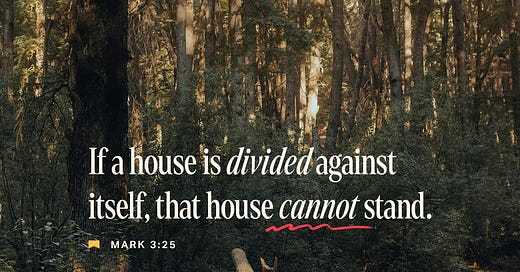Sunday Stretch: Vol. 84
Start off your week with a grounded take on Bible, prayer, the world, and your life ...
Hi Readers,
Some exciting news this morning! I’m preaching my first sermon in my new (permanent) call congregation today, at 10:45 CT, at Lake Nokomis Lutheran in Minneapolis. You can watch it here, if you’re interested.
I’m especially looking forward to this moment because I’ll be sharing specifically on the story of Mary Magdalene, and I’ll be incorporating the new groundbreaking research from Libbie Schrader, shared extensively in this post from
.I’m writing this message to you a few days before you’re reading it, after I spent several hours reading and researching and praying and studying Bible texts. And I have to tell you that it feels so energizing to deeply engage with the texts, even on days when the news seems overwhelming, and stressful, and American Christians seem determined to condense the Gospel into a message of hate, exclusion, anger, and (yes, unfortunately) white supremacy.
But all of that gets peeled back when I take the time to really dwell in the word and to engage with the text with hopefulness and curiosity, as I imagine Schrader did as she began to do this important work. I’m grateful for her, and for Diana, and for Sara, our lead pastor at Lake Nokomis, and for so many of you - who remind me that yes, the Truth insists upon being heard.
Let’s get to the texts!
Bible Stories
Genesis 3:8-15
Gen. 3:8 They heard the sound of the LORD God walking in the garden at the time of the evening breeze, and the man and his wife hid themselves from the presence of the LORD God among the trees of the garden. 9 But the LORD God called to the man, and said to him, “Where are you?” 10 He said, “I heard the sound of you in the garden, and I was afraid, because I was naked; and I hid myself.” 11 He said, “Who told you that you were naked? Have you eaten from the tree of which I commanded you not to eat?” 12 The man said, “The woman whom you gave to be with me, she gave me fruit from the tree, and I ate.” 13 Then the LORD God said to the woman, “What is this that you have done?” The woman said, “The serpent tricked me, and I ate.” 14 The LORD God said to the serpent,
“Because you have done this,
cursed are you among all animals
and among all wild creatures;
upon your belly you shall go,
and dust you shall eat
all the days of your life.
15 I will put enmity between you and the woman,
and between your offspring and hers;
he will strike your head,
and you will strike his heel.”
Oh, this passage! I definitely spent some detailed time with this passage when I was working on Chapter 3 of my new book, Disciples of White Jesus. Many who write about masculinity are drawn to these verses and infuse into them a certain sense of male superiority.
In a broader sense, these verses form the foundation of the Church’s understanding of the Fall, a theological category that grew especially popular during the time of the Medieval Church, when the Church sought to establish itself as the most powerful force in Europe.
A strong sense of internalized human depravity is of course a foundational part of Martin Luther’s theology as well. And while I’d concur with the necessity of the First Use of the Law to bring us to repentance and forgiveness, I’d also say that this theological idea (despite its inarguable truth) has been manipulated and abused by those in power, especially religious leaders, to “keep down” people on the margins and people with a lack of agency and liberty (oh hey, especially women, in this sense!)
So what do we do with this passage then, if not that?
I look back at the initial lines of this passage and realize how quickly I often breeze through them. Slowing down, I see a God who desires to come incredibly close to creation, a God who is walking through the garden - a God who feels the gentle breeze.
Questions to Ponder
What is the role of shame in this passage?
What caused the first humans to feel shame?
What do you make of the curse that God gives to the serpent (and the woman)?
2 Corinthians 4:13-5:1
2Cor. 4:13 But just as we have the same spirit of faith that is in accordance with scripture—“I believed, and so I spoke”—we also believe, and so we speak, 14 because we know that the one who raised the Lord Jesus will raise us also with Jesus, and will bring us with you into his presence. 15 Yes, everything is for your sake, so that grace, as it extends to more and more people, may increase thanksgiving, to the glory of God.
Living by Faith
2Cor. 4:16 So we do not lose heart. Even though our outer nature is wasting away, our inner nature is being renewed day by day. 17 For this slight momentary affliction is preparing us for an eternal weight of glory beyond all measure, 18 because we look not at what can be seen but at what cannot be seen; for what can be seen is temporary, but what cannot be seen is eternal.
2Cor. 5:1 For we know that if the earthly tent we live in is destroyed, we have a building from God, a house not made with hands, eternal in the heavens.
2 Corinthians 4 is the Apostle Paul at his rhetorically most powerful, most honest. It’s worth
Keep reading with a 7-day free trial
Subscribe to I'm Listening to keep reading this post and get 7 days of free access to the full post archives.




